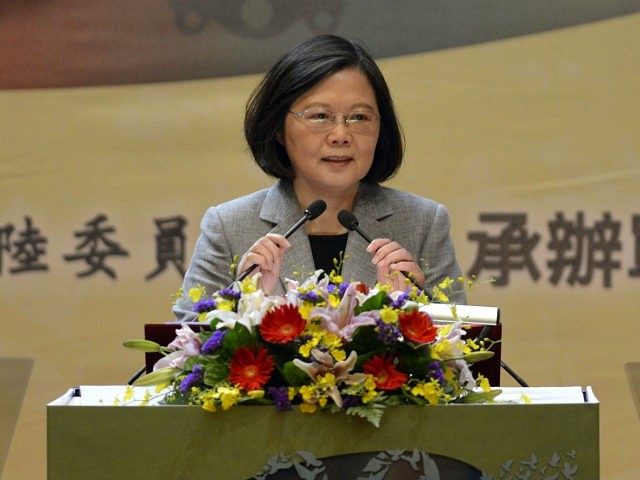Despite China’s demands to deny her entry, Taiwanese President Tsai Ing-wen made a scheduled stopover in Hawaii on Saturday, en route to the Pacific Islands.
During her visit, she promised to boost Taiwan’s defense spending, prompting the outraged Chinese Communist Party organ Global Times to condemn her transit of U.S. territory as “deplorable.”
Tsai promised defense spending increases of at least three percent per year, and possibly more, to address U.S. concerns about a “possible military imbalance in the Taiwan Strait,” as reported by Reuters.
Taiwanese media is quoted claiming that U.S. Ambassador James Moriarty expressed concerns about the double-digit growth in Chinese military spending in recent years and asked Tsai to improve the combat effectiveness of Taiwan’s forces in response.
Speaking in Hawaii, Tsai said U.S.-Taiwan relations are “unprecedentedly friendly” at the moment. She expressed happiness at American “promises of peace and stability for the Asia-Pacific region” and said she understood the importance of increasing Taiwan’s “investment in defense.”
“Taiwan is well armed with mostly U.S.-made weapons but has been pushing for sales of more advanced equipment, such as fighter jets, to deal with what Taipei sees as a growing threat from China and its own rapidly modernizing armed forces,” Reuters observes.
The Chinese Communist Global Times sneers that Tsai’s transit of U.S. territory to visit Taiwan’s “allies” in the Pacific (a term swaddled in scare quotes, because there are only 20 of them left, and they tend to have smaller populations than Taiwan does) is a mere “trick the Taiwan administration has long been fond of playing.”
The Global Times fumes over the precisely calibrated level of importance her American hosts showed to Tsai’s visit and accuses Washington of conspiring with Taipei in “sneaking calculations” to create unrest in Asia. That should be difficult if the whole world embraces Beijing’s “one China” viewpoint, as the Communist paper asserts, but somehow Taiwan’s “petty actions” and “radical tricks” are seen as a dangerous threat to Chinese prestige.
In a separate piece, the Global Times rolled out a bevy of “experts” from China to simultaneously assert that Tsai’s visit to Hawaii was “meaningless in practice” and a “little trick,” but also an insult and menace to regional stability to which China must respond. One of the experts even muses that if Taiwan keeps pulling these meaningless little tricks, mainland China might feel compelled to “reunite the country by force.”
Reading between the lines, China’s hyperventilating about Tsai’s visit is mostly a bid to continue their full-court diplomatic press against Taiwan’s allies, which is part of a long-term strategy to make the Taiwanese feel their independence from the mainland is pointless and more trouble than it’s worth. Statesmanlike treatment from the United States deposits credibility and prestige into a Taiwanese diplomatic account that Beijing would very much like to empty.
China is also worried that Tsai might tip the Taiwanese public into demanding the formal recognition and complete independence that the “one China” policy rules out, but which her political party has advocated. A spokesman for the Chinese Foreign Ministry made that explicit when he urged the United States to “avoid sending any erroneous messages to the Taiwan independence force.”
The question is whether China will remain satisfied, if constantly irritated, with Taiwan’s current status. As retired Taiwanese strategic professor Lin Chong-pin mused to the Associated Press, “We know that [Chinese President] Xi Jinping is an extremely ambitious leader and he doesn’t want to get to 2020 with his Taiwan scorecard a blank.”

COMMENTS
Please let us know if you're having issues with commenting.